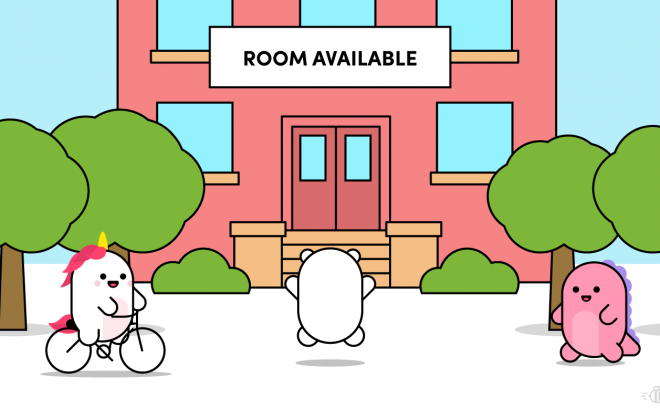20 Funny German Idioms You Should Know
It’s very easy to develop a taste for the beauty of languages, and comparing a foreign language to your own often makes you appreciate both even more. Whether it’s the language of business, the language of love, the language of passion, the language of food or the language of logic (we’ll leave it up to you to decide which language you think is which ;)) or others, each and every language is packed with funny historic quirks that have given rise to a wealth of idioms over the course of time.
This post will introduce you to a small selection of funny German idioms to brighten your day and help to keep you motivated on your German language learning journey if you’re a learner, or maybe inspire you to get started if you are not.
Mit ihm kann man Pferde stehlen
Gone horse stealin’
You can steal horses with him, that’s how much you can trust him to be up for anything you suggest! Every group of friends has that one guy or gal that has a hyperactive streak, who’s always up-for-anything and never has a no for anyone. No matter how daft the activity might seem to be… let’s do it, it’ll be a laugh!

Einen Vogel haben
Being a little cuckoo
Whereas in English we usually talk about a single bird when we want to say someoone is a little crazy, the cuckoo, German folklore claims that the origin of madness is to have a bird, any bird (the cuckoo is the usual suspect here, but the presumption of innoncence must be upheld), nesting in or on your head. While psychiatrists might dispute that as an actual precursor to insanity, it would definitely drive most people a little barmy!

Zu tief ins Glas schauen
Glass gazing
A creative way of denying that you’ve had too much to drink could be to claim that you have been gazing deeply into the bottom of a glass, looking for inspiration to come up with the answers to the questions that really matter in life…If you claim to be doing that and actually believe it though, you’ve obviously been “glass gazing” for a little bit too long and it would be a good idea to not drive tonight!

Kleinvieh macht auch Mist
#Winning
This one is a motivational quote (of sorts) to remind us that no matter where you start from, every small win is a win nonetheless and you should celebrate, feel good and be proud of all of them! Every. Single. One :D!

Sich zum Affen machen
Being a monkey
The concept behind this one is very similar to the English equivalent “to make a fool of oneself”, but instead of a fool, the subject in question is a monkey! Or an Ape, to be more “generic-specific”, but you get the idea 😉

Unter aller Sau
Being beneath pigs
This expression literally means to be “all under pig” or possibly “under every pig” but what it tries to say is something along the lines of “very very bad”. It probably originated and is a variation to the expression “unter alle Wurde” (beneath all dignity), so it’s actually also a compliment to the dignified nature of sows!
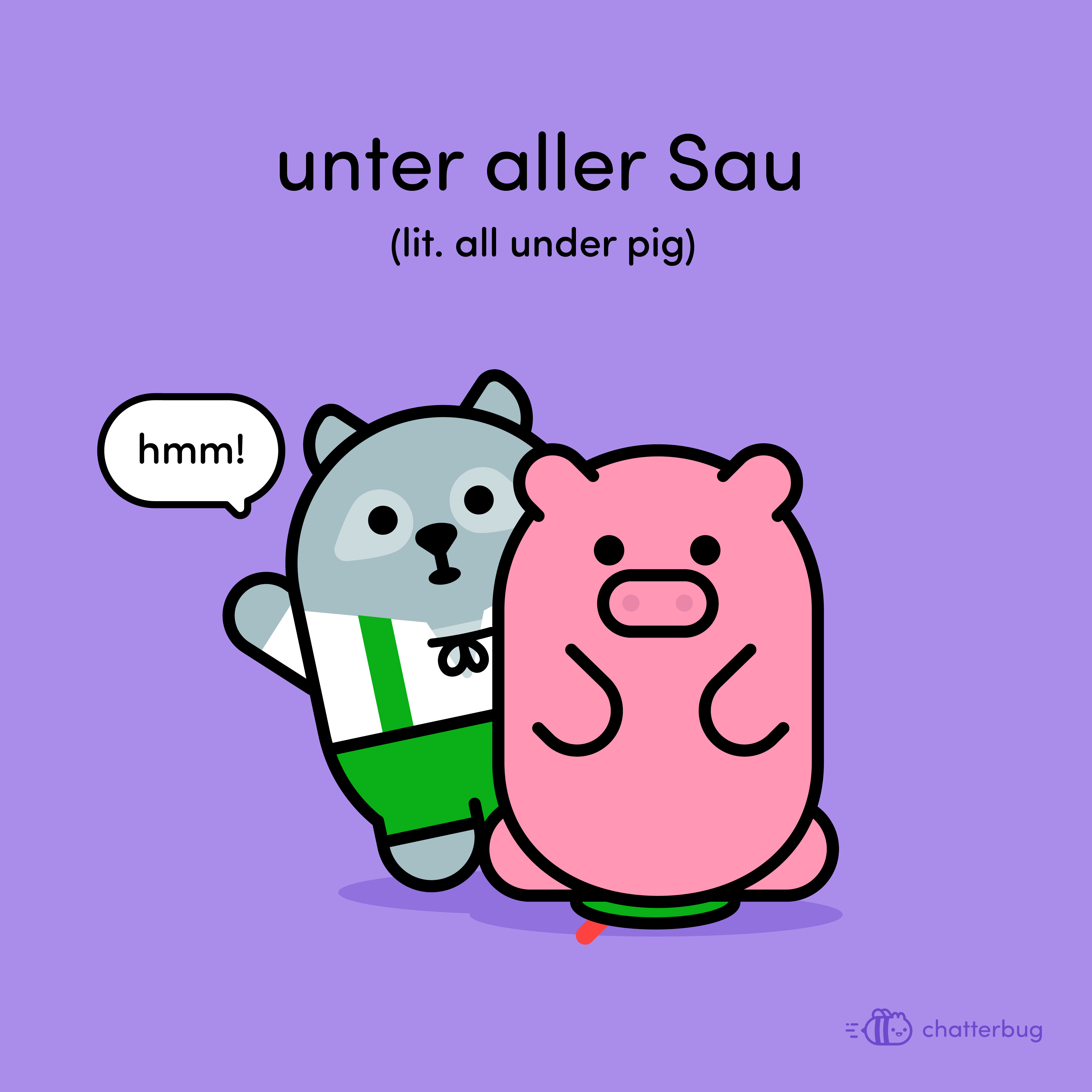
Einen Putzfimmel haben
Cleaning frenzy
Literally translating as a “cleaning mania”, this is one that’s often welcome! Having someone in the office or living with you that enjoys keeping things clean is not something most people complain about.

Tomaten auf den Augen haben
Tomato goggles
We’ve all heard of beer goggles, right? In a similar way to beer goggles making people seem more attractive than they actually are, having tomatoes on your eyes makes it kind of hard to see anything at all! Can’t see something that’s right in front of you and has been there for a while AS you’ve been looking for it? Might be because you’ve had tomatoes on your eyes blocking the view the whole time!
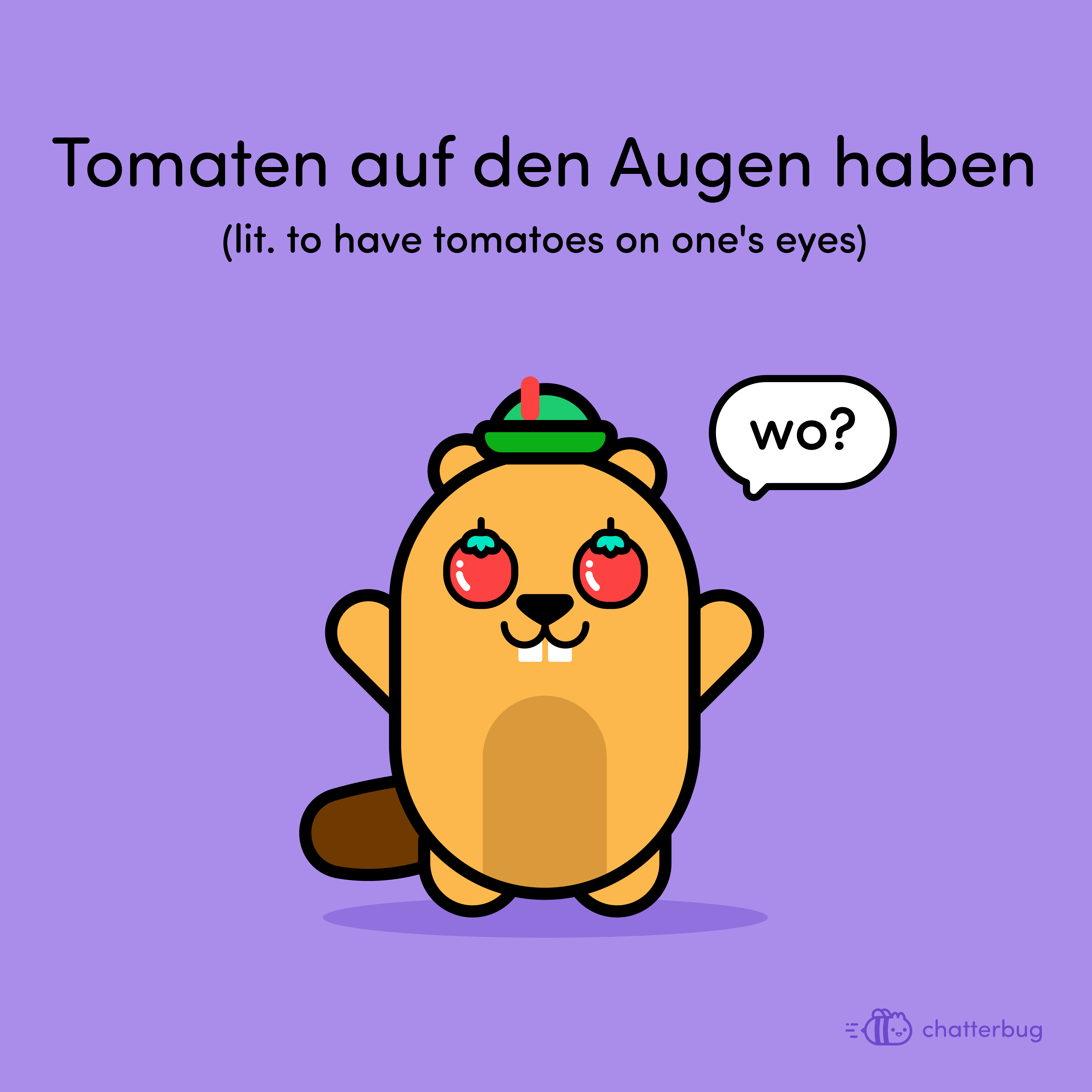
Die beleidigte Leberwurst spielen
Being an offended…er…sausage
You can’t get much more German than various kinds of sausages, and the liver sausage was (and remains) particularly popular. So it’s not very surprising that there are German expressions that revolve around sausages. In the Middle Ages, it was believed that the liver stores “vital juices” where temperament comes from. Logical as ever, Germans make the connection between being unnecessarily offended and behaving like a liver sausage!

Du bist doch nicht aus Zucker!
You’re not made of sugar!
This idiom is for those of you for whom the world stops whenever there’s a cloud in the sky and it might drizzle a little bit so you won’t leave the house. Sweet as you undoubtedly are, you’re not made of sugar, so don’t worry. Even if you run the risk of maybe, possibly, hypothetically, potentially getting rained on a little, it’s not the end of the world – you won’t melt! If you must go out, however, and you simply don’t like getting wet, that’s what umbrellas are for!

Einen Korb geben
Giving someone a basket
In Germany, if you’ve got a bit of a crush on someone but they don’t feel the same way about you and you get rejected, you might get given a basket as a bit of a consolation “prize”! The origin of this saying goes back to the middle ages, and it was included in the 19th Century dictionary by the Grimm brothers. Like in many matters of love, the idea was to reject suitors in an indirect way.
“If you come up hoisted in a basket, I shall let thee lie with me” – trouble is, either there is the basket and the rope breaks or there is nobody strong enough to pull it up! Clever way to get rid of unwanted attention!
“Here, have a basket!”

Alles in Butter
Buttery goodness!
On a more positive note, if someone ever asks you how you are, “Wie geht’s?“, and you’re feeling on top of the world, something that you can say to them is that “everything is in butter”. The origin of this is thought to lie in early gastronomy, whereby German restaurateurs would advertise that their kitchen used only the most expensive type of fat – butter!

Um den heißen Brei herumreden
Stop talking around the hot mash
Germans have a reputation for being direct, so you probably won’t find them ‘beating around the bush’. But if you happen to want someone to get straight to the point, you can tell them: ‘Rede nicht um den heißen Brei herum’.

Lügen haben kurze Beine
Lies have short legs
According to the Germans, ‘lies have short legs’. The meaning of this expression is pretty straight forward. It can be handy if you feel that the person who was previously ‘talking around the hot mash’ may now be lying to your face. Either way, their lies won’t get very far with those little legs.
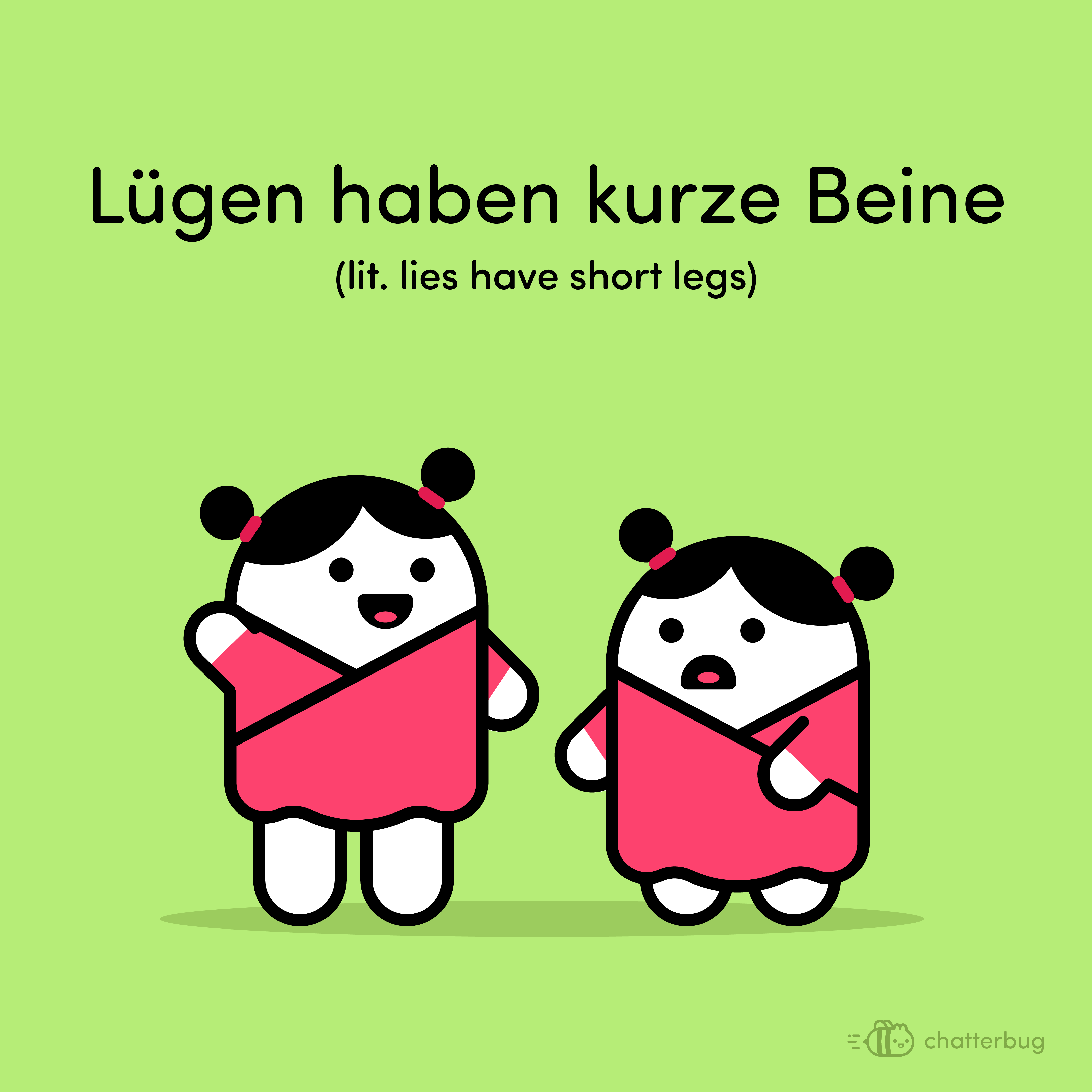
Fix und fertig
Quick and ready
You may be tired of saying ‘ich bin müde’ to express how tired you feel. Well, you can also say ‘ich bin fix und fertig’. Although this translates directly to ‘I’m quick and ready’, it actually means ‘I’m exhausted’.
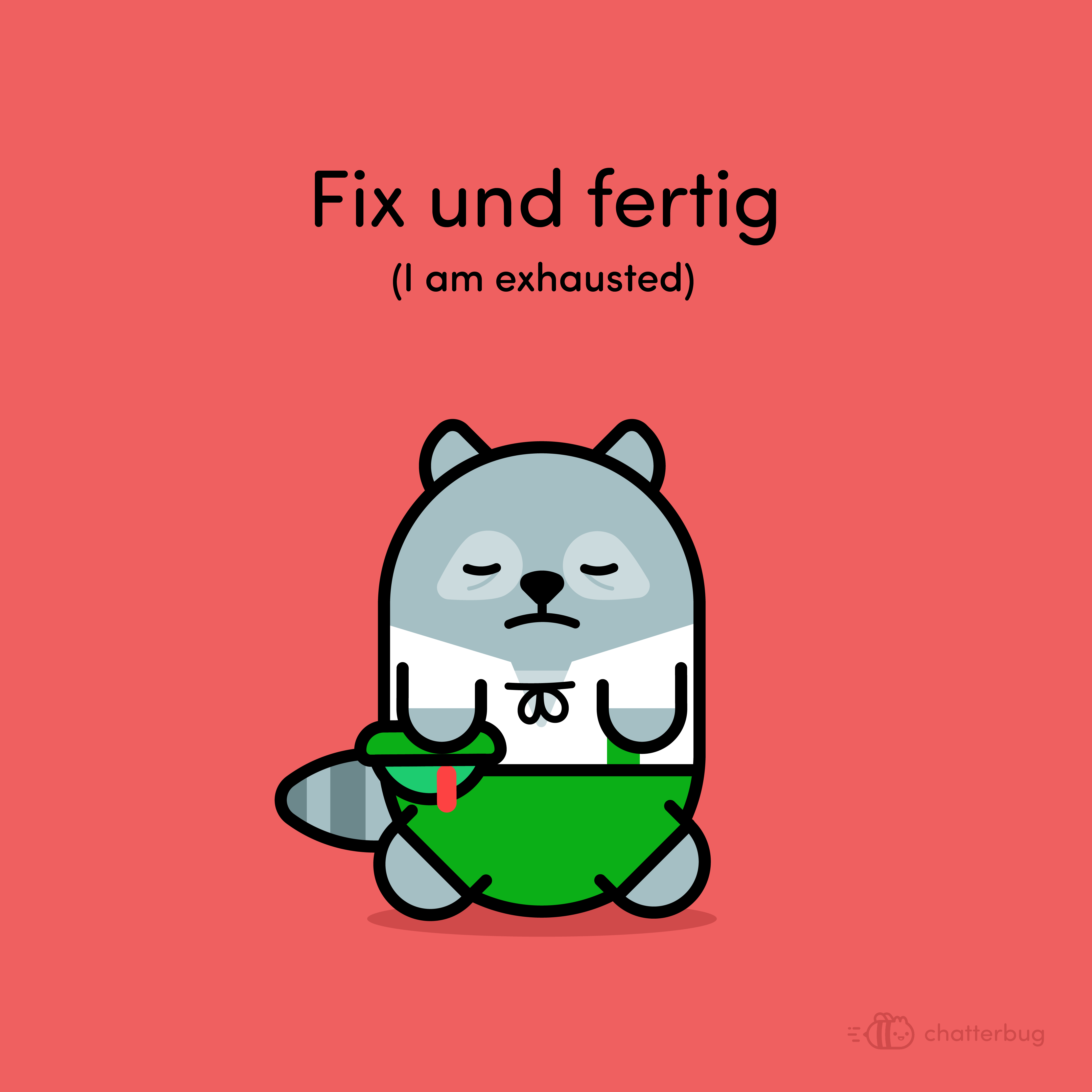
Ich glaube ich spinne
I believe I spider
Sometimes, German idioms make a lot of sense, and sometimes you can’t understand the origin of the expression. This one counts towards the latter. When you feel you’re going crazy, in German you literally say ‘I believe I spider’.
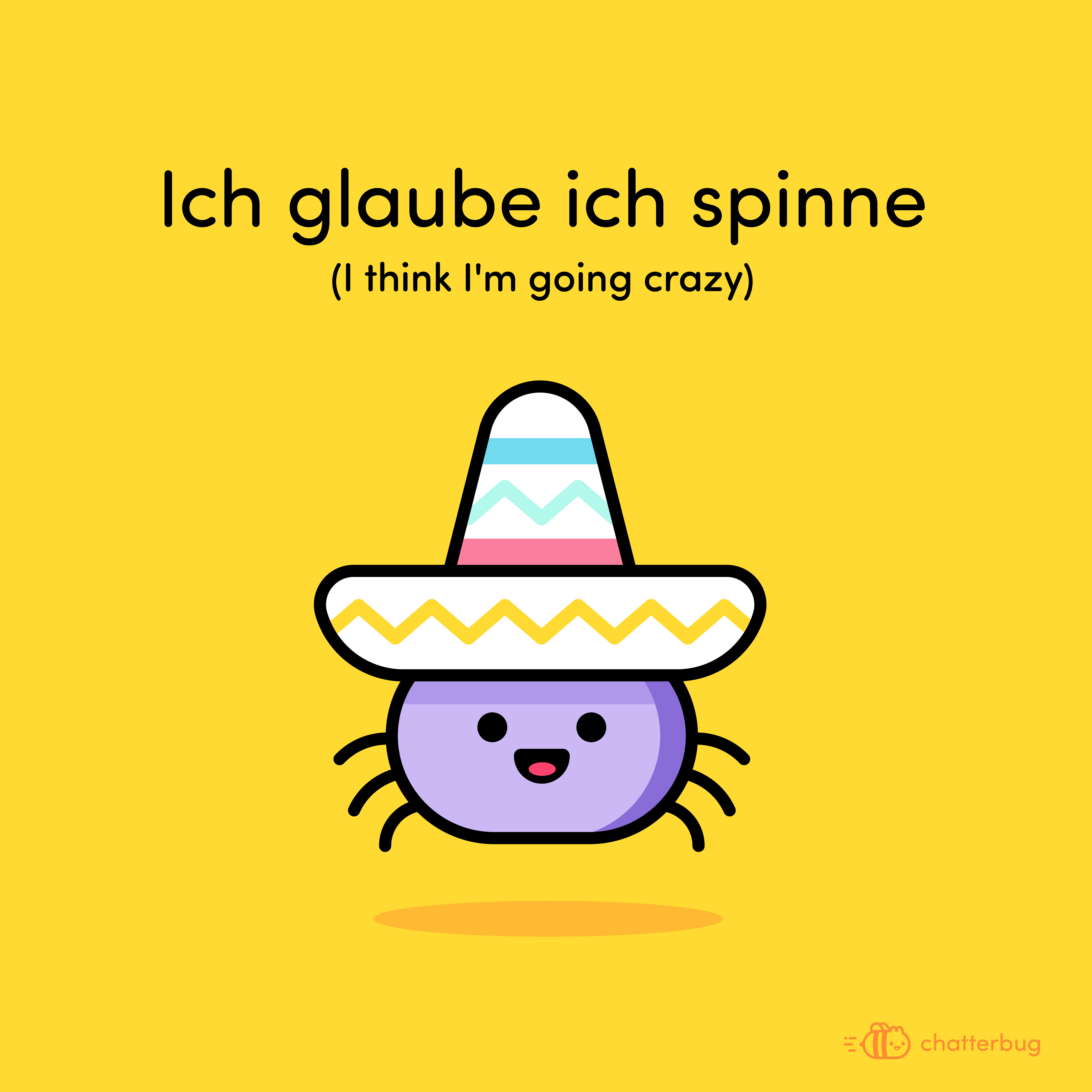
Ich verstehe nur Bahnhof
I only understand train station
This phrase literally translates to ‘I only understand train station‘, but is equivalent to ‘It is all Greek to me‘. It’s an old expression from WW1 soldiers who used to say that the only thing they understood when given orders was ‘train station’, as they hoped for the train back from the battlefront.

Da steppt der Bär
There the bear dances
Your friends organized a party and you couldn’t wait to come. ‘There will be a dancing bear’ they said. Of course, there wasn’t. But you now know that you can use this expression to tell everyone where the fun’s at next time you throw a party.

Einen Kater haben
I have a cat
You had too many pilsners at your friend’s party and regret it the following morning? Well, being hungover happens and you can surely make it through the day. But if you want to tell your German friends how you feel, you’ll need to say literally ‘I have a cat’: ‘ich habe einen Kater’.

Alles hat ein Ende, nur die Wurst hat zwei
Everything has an end, only the sausage has two
Germany is a land of sausage and poets, and that’s probably why Germans came up with this popular poetic wisdom: ‘everything has an end, only the sausage has two’. Pragmatism and simplicity: the German conception of beauty.

A good way to impress natives is to drop some idiomatic expressions at the right moment in a conversation. If you’re feeling adventurous and you’re agile enough, another good idea can be to try to adapt them and make up some of your own that natives can get and often find amusing as well. Using idioms as part of your German learning toolkit and playing around with language is fun, don’t you reckon? For more funny idioms and language fun be sure to check out our Instagram page.
Mach’s gut!
Want to learn more?
If you’re feeling inspired, sign up below for a free Live Lesson with a private qualified tutor to start speaking a new language for real! Our classes are structured around exercises created by language teachers, so there’ll be no awkward silences – we promise! 😉

